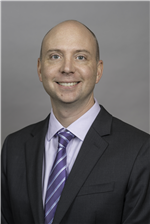ChE Seminar: Dr. Charles M. Schroeder
| Event Date: | November 6, 2018 |
|---|---|
| Speaker: | Dr. Charles M. Schroeder |
| Speaker Affiliation: | University of Illinois |
| Time: | 3:00-4:15 pm |
| Location: | FRNY G140 |
| Contact Name: | Davidson School of Chemical Engineering |
| Open To: | Attendance required for PhD students |
| Priority: | No |
| School or Program: | Chemical Engineering |
| College Calendar: | Show |
 Dr. Charles M. Schroeder
Dr. Charles M. Schroeder
Professor and Ray & Beverly Mentzer Faculty Scholar
Department of Chemical and Biomolecular Engineering
University of Illinois
"Self-assembly and single molecule charge transport in conjugated peptide/synthetic materials"
Part of the Fall 2018 Graduate Seminar Series
Abstract
A major challenge in bioorganic electronics lies in the development of soft, deformable, and electronically active materials that can readily assemble into hierarchical structures. Our group uses a molecular design and engineering approach to develop and study new materials for robust bioelectronic interfaces. In this talk, I will discuss recent work that focuses on pi-conjugated peptides that can be engineered for precise supramolecular assembly and charge transport applications. First, I will describe the kinetics of non-equilibrium self-assembly of pi-conjugated peptides using a combination of experiments and analytical modeling. Pi-conjugated peptides are guided to assemble under reaction-dominated or diffusion-dominated conditions, such that the morphology of emergent peptide fiber network is controlled by assembly kinetics. An analytical reaction-diffusion model is used to describe the assembly process, and experimental results are compared to the model across a range of parameters (e.g. Damkohler number). Microrheology is further used to study the sol-gel transition of these materials during assembly, which enables direct measurement of modulus and photophysical properties during gelation. In situ confocal fluorescence microscopy and in situ fluorescence lifetime imaging microscopy (FLIM) are also used to characterize peptides during the assembly process. Phase diagrams and equilibrium assembly properties are experimentally determined across a wide range of conditions. In the second part of the talk, I will discuss the direct measurement of the electron transport properties and conductance of single molecules and oligomers. Here, we measure the conductance of single biomolecules and sequence-defined synthetic oligomers using a scanning tunneling microscope-break junction technique (STM-BJ). Using this approach, we characterize the electron transport properties of new classes of pi-conjugated oligomers as a function of primary monomer sequence. In this way, our work provides fundamental information underlying electron and charge transport behavior, which will be used to inform future design of molecular electronics materials.
Biography
Charles Schroeder is Professor and Ray and Beverly Mentzer Faculty Scholar in the Department of Chemical & Biomolecular Engineering and Co-Leader of the Molecular Science and Engineering Theme in the Beckman Institute for Advanced Science and Technology at the University of Illinois at Urbana-Champaign. He is a member of the Center for Biophysics and Quantitative Biology, with affiliate status in the Department of Materials Science and Engineering, the Department of Chemistry, the Department of Bioengineering, the Frederick Seitz Materials Research Lab, and the Carl Woese Institute for Genomic Biology at Illinois. Professor Schroeder received his B.S. in Chemical Engineering from Carnegie Mellon University in 1999, followed by an M.S. and Ph.D. in Chemical Engineering at Stanford University in 2005 with Eric Shaqfeh and Steve Chu. Before joining the University of Illinois in 2008, he was a postdoctoral fellow at Harvard University and the University of California-Berkeley. Professor Schroeder has been the recipient of several awards, including a Packard Fellowship in Science and Engineering, a Camille Dreyfus Teacher-Scholar Award, an NSF CAREER Award, the Dean’s Award for Excellence in Research, the Arthur B. Metzner Award from the Society of Rheology, and an NIH Pathway to Independence Award (K99/R00).
